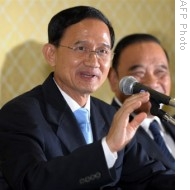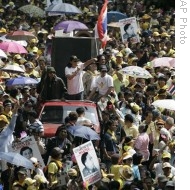VOA标准英语10月-Thai PM Resists Resignation Calls Despite Pressur(在线收听)
 |
| Somchai Wongsawat (l) speaks during press conference at Bangkok airport, 17 Oct 2008 |
Thai Prime Minister Somchai Wongsawat told reporters Friday he would not step aside, vowing to continue to work despite calls from military chiefs for his resignation.
An anti-government rally on October 7 left at least two dead and 400 wounded when Thai border and local police opened fire with tear gas and incendiary devices on thousands of protesters outside parliament. At least 20 police were also injured in the violence.
Prime Minister Somchai says the government will await the results of an investigation before making a decision on the government's next moves. He said his work covered official duties, including the funeral rites for the Thai King's late sister, and hosting a regional summit of Asian leaders in December.
A day earlier, army chief General Anupong Paochinda, speaking on national television, called on the government to "take responsibility" and resign.
Mr. Somchai assumed the post of prime minister in September, after the former government leader, Samak Sundaravej, was forced to stand down after being found guilty in a case of conflict of interest.
 |
| Several thousand anti-government protesters block streets in downtown Bangkok, Thailand, 17 Oct 2008 |
Protesters on Friday, led by the People's Alliance for Democracy, or PAD, called on the government to resign.
A protester said the government needed to heed the Thai army chief's call to resign. "Yes, I fully agree with him [the Army chief] - the government should resign immediately," he said.
Political analyst Chris Baker said Prime Minister Somchai may be under pressure to remain in office to assist his brother-in-law, former Prime Minister Thaksin Shinawatra, who is facing several court cases. Thaksin fled to Britain in August during a key corruption case. Courts have since issued several warrants for his arrest.
The People's Alliance for Democracy has accused the government, elected last December, of acting as a proxy for Thaksin. Analysts say the administration is seeking to amend the constitution to halt investigations and court proceedings against Thaksin, his family and supporters.
"I think the only way you can explain it is that Thaksin has put a lot of pressure on his brother-in-law to stand up there and take the heat - it is very high risk indeed. I think the priority is to try and overthrow as much of the court processes as they can - that means they have to hold the current attorney general in place," said political analyst Baker.
Thailand's politics remains deeply divided. Thaksin, elected in 2001, maintains strong support in rural areas, due to his government's populist polices of low cost health care and village support funds.
But the urban middle class has accused Thaksin and his supporters of abuse of power. Calls for Thaksin to resign in 2006 led to a last military coup that September. The armed forces say they are ruling out a coup, and have called on the government to settle the problems through the political process.